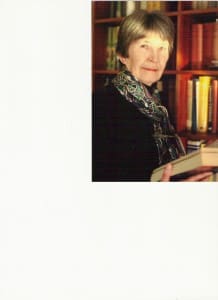 Tell us about yourself and how many books you have written.
Tell us about yourself and how many books you have written.
I was born in Neuchatel, Switzerland. My mother was Swiss, my father English and they met on a ship going to New Zealand. This may have contributed to that part of my genes which made me a travel writer. My school days were through World War Two in the suburbs of London. During that time, at the age of ten, I filled school exercise books with stories of a friendly dragon who took two human children on adventures. First they had to manoeuvre their way through barrage balloons, rising shells, descending bombs. At least that part of the stories was real.
I was really dedicated to writing and not interested in marriage; but in the end I did marry at the age of 45 to George Spenceley, a lecturer, photograph, climber and explorer, who actually has a glacier named after him on the Antarctic island of South Georgia. In spite of a late marriage, we still managed 37 wonderful years together before he died in February 2013. I don’t think I shall stop missing.
I became a travel writer, created short stories and eventually novels. Perhaps because of my childhood one of my favourite themes was ‘what war does to people’ – i.e. the effect of war on the children and grandchildren of participants. I wrote four novels on this theme, and then my first Young Adult book, dealing with addiction. There were also two anthologies of short stories. The latest of these came out in December 2014, then as an Ebook in January 2015 and an audio book in July 2015.
What is the name of your latest book and what inspired it?
My second anthology is called “It’ll be Better Tomorrow” – this was George’s title for it was what he said whenever I expressed concern about our future. He had many disabilities by then, including dementia. This anthology is dedicated to ageing. After George’s death I spent some time in a care home and discovered what an interesting lot we are. The following is the back cover blurb which gives an idea of the characters: “Teenager Buzz was blown away when he found how his Granny Em had put his lessons on computing to very unusual use (Grannies dot com). Harry Briggs was another one who managed to turn the tables with a little help from his grandson and modern technology (Wake Up Call). In contrast, Elli (The Class of ‘65) and Phillida (The Don’t Care Generation) had both left an impression on the Third World; Alice learned at last to stand up for herself (The Wrong Track), Robert Sinclair kept his exploits to himself (Reluctant Hero), and Astra finally solved the mystery of her father’s World War Two trauma (Just Nineteen Days). But maybe the last word remains with Ben whose mantra provided the title for this book. When pushed about his uncertain future, he unfailingly said “It’ll be Better Tomorrow.”
These are some of the stories of Manorfields’ residents, their relatives and their carers. There is humour, poignancy, even romance, but above all they demonstrate that life is very often stranger than fiction.”
Do you have any unusual writing habits?
I don’t think it’s unusual to like curling up with a big scribbling pad and a pen; I really like the feel of pen on paper. But of course I also appreciate the options offered by computers to cut and paste.
What authors, or books have influenced you?
An awful lot over such a long lifetime. The ones whom I prefer to emulate are the ones that get straight into a story and who tell rather than show; though that’s not always easy.
What are you working on now?
A novel based on the last half of the twentieth century – no world wars, but major changes in technology, in relationships and in society. The first probably spells the greatest danger. A mystery story is nudging in the back of my mind.
What is your best method or website when it comes to promoting your books?
I do talks on the subjects of my books, which is time-taking but quite productive. I also facebook and twitter: especially organisations who focus on the subjects of my books.
Do you have any advice for new authors?
Write every day, even rubbish; if you’ve got a block check through some earlier writing; if you are still blocked do some research.
What is the best advice you have ever heard?
as above
What are you reading now?
“Guns Germs & Steel” by Jared Diamond, A short history of everybody for the last 13,000 years. It’s a great read and encourages us to explore further. I also enjoy confirmation of the fact that we still don’t know it all.
What’s next for you as a writer?
More writing, that’s for sure.
Author Websites and Profiles
Sylvie Nickels Website
Sylvie Nickels Amazon Profile
Sylvie Nickels Author Profile on Smashwords
Sylvie Nickels’s Social Media Links
Facebook Profile
Twitter Account